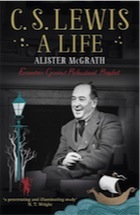McGrath, Alister. C.S Lewis: A Life – Eccentric Genius. Reluctant Prophet. Hodder and Stoughton, London. 2013. ($19.99 AU)
The life and literature of Clive Staples Lewis continues to capture the imagination of millions. His writing crosses cultural, denominational, linguistic, and age barriers with disarming ease. Fifty years after his death his apologetic, academic, and fictional works continue to sell across the globe. Biographies written by those closest to him are sought and read for their insight to Lewis, the man.
Lewis, it would seem, is even more famous today than he was in life.
Contributing authentically to the literary corpus that surrounds C.S. Lewis would seem a challenging undertaking indeed. Alister McGrath, however, has achieved this feat with his new book: Lewis: A Life – Eccentric Genius. Reluctant Prophet.
McGrath’s title captures something of the essence of his perspective on Lewis. He was certainly prophetic in that he spoke publicly and persuasively regarding the Christian vision. But McGrath suggests that ‘Lewis spoke on its (Christianity’s) themes largely because of the silence or unintelligibility of those he believed were better placed than he was to engage religious and theological questions publicly.’ (p. xii). He wrote and spoke, it would seem, with some reluctance. His academic standing – spanning both Oxford and Cambridge Universities – and his consistent departure from ‘…recognised, conventional, or established norms or patterns…’ made Lewis a man of the margins in both private, public, and religious life. He was both genius and eccentric.
Unlike previous biographers, McGrath, was not a personal acquaintance of Lewis. His knowledge of Lewis came through his writings. Many modern readers, I would suggest, will relate closely to this reality. We have come to know, and love, Lewis almost exclusively through his books.
Importantly, Lewis: A Life makes extensive use of the recently edited and published personal letters of Lewis (Collected Letters, 2004 and 2006). McGrath has read these with care and makes reference to them throughout. Indeed, in McGrath’s own words, they form a ‘narrative backbone’ to the book. This is unique among Lewis biographers and makes this work surprisingly personal and accessible. As McGrath suggests, these more occasional writings allow ‘…Lewis’ intellectual, social, and spiritual trajectory to be tracked in detail.’ (p. 368).
McGrath’s new biography points to a complex, private, and ever changing lover-of-literature who initially found fame through his compelling defense of the Christian faith. But, in McGrath’s hands, these letters and books introduce the reader to much more than a man who defended the faith. They point to one who celebrated Christianity in all its wonder and mystery.
Lewis: A Life is a unique and readable biography that genuinely contributes to our understanding of one of the most significant Christian writers of the twentieth century.
